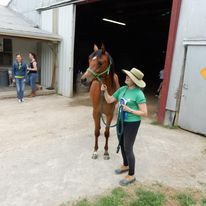How to stay Young & Energetic like Ron & Lisa do!
posted on
February 7, 2022
Note: Read to the end to see what new meat product The Bergners would like added to The Maker’s Meadow. Add your comment below if you too would like us to add it to our store!!

It's seems like perfect timing to introduce you to our Customer Spotlight Couple just two days before Valentine's Day.❤
I would like you to meet Ron and Lisa Bergner.
They recorded a video for us a few years ago showing us what you will find packed inside the Medium Pork Bundle. Just in case you’re wondering while watching this video... Ron stands 6 feet 7 inches tall!!
Ron and Lisa Bergner are not only long-time cheerleaders and customers of The Maker's Meadow, but also a wonderful couple who has stayed in love, young at heart and young for their age.
No doubt they have an uncanny, contagious zest for life.
How is it they are so full of energy and don't "act their age?"
Here are a few possibly reasons why...
#1 Reason: They stay physically active!
Lisa loves to ride horses and cook from scratch.

Ron runs trails, inline skates, ice skates, swims, and loves to ride a Unicycle.

Did I mention they are in their early to mid 60’s?
#2 Reason: They value clean eating!
Ron will be the first to say he loves his wife’s cooking as she makes everything “from absolute scratch.”
Truthfully, they avoid eating out as much as possible and enjoy eating at home.
Their eating habits changed thanks to a book entitled Natural Cures “They” Don’t Want you to Know About written by Kevin Trudeau and published in 2005 followed by More Natural “Cures” Revealed in 2006.
“Woke me up! That book changed me,” says Ron. “If you eat only clean beef and go back to eating ‘Big Ag’ beef, you’ll get sick.”
Ron discovered this to be true. Lisa tried to warn him but while on vacation he smelled some really good hamburgers cooking from a small ‘mom and pop shop’ and it was just six months to a year after they had started eating well. He gave in and ate the hamburger. His “experiment” did not end well.
“It went right through me!” Ron exclaimed.
They haven’t eaten fast food in years and instead purchase foods from local places like The Maker’s Meadow--which remains their sole source for meat.
Lisa says, “It’s a super place with great people. It’s nice to meet honest-to-goodness people who think along the same lines as we do, especially health wise.”
Ron adds, “How they treat their animals is fantastic. If animals are under stress, they produce bad aminos and bad fats. If treated well, animals will produce good fats, B12, and have a high nutritional value.”
They also highly recommend watching the documentary Thrive.
#3 Reason: Ron & Lisa love to bring friends together!
Each year they host “The Big Bean Cookout in the Woods” outside on their property usually in October or early November. They will use a ham from our farm along with some organic beans and cornbread. It’s a wonderful time of friends gathering together. If you get to know them, they will be quick to invite you too!
#4 Reason: They have future plans to build a Food Forest!
They have 50 acres upon which they want to grow heirloom fruit trees including paw paw (and lots more) along with nut trees like pecans, beechnut, hazelnut, and more! They also want to grow herbaceous plants like horseradish along with native prairie grasses. They hope to attract wildlife and to be able to eat sustainably with a veritable forest of fruits, nuts, berries, flowers and other perennial herbs and greens that are naturally pollinated, control pests with beneficial insects, and reproduce abundantly every year.
#5 Reason: They are quick to share what they love!
Next up, I wanted to give you a quick and easy recipe that Lisa kindly shared with us that Ron raves about!
Slow Cooked Pork Roast or Beef Roast Recipe
Set Oven to 250 degrees Fahrenheit
Before you go to bed, place FROZEN roast in a dutch oven
Add water to the bottom
Top with raw onions, garlic, and organic celery salt
Add Lid
Note: Ron says after Lisa goes to bed he likes to sneak back in and add a little bit of “Worcestershire Sauce.” :)
Wake up in the morning to heavenly aromas of a tender roast!
For added variety, they sometimes will top the Pork Roast with Sauerkraut (Fab Ferments Dill Kraut)
Lastly, Ron and Lisa say they would absolutely love it if The Maker’s Meadow added Pork Kielbasa to the online store for their jambalaya recipe.
Would you like to purchase Pork Kielbasa from The Maker’s Meadow as well?
If so, please “cast your vote” by mentioning it in the comments below.
The more people who request a new product such as Pork Kielbasa, the more likely we will add it!



